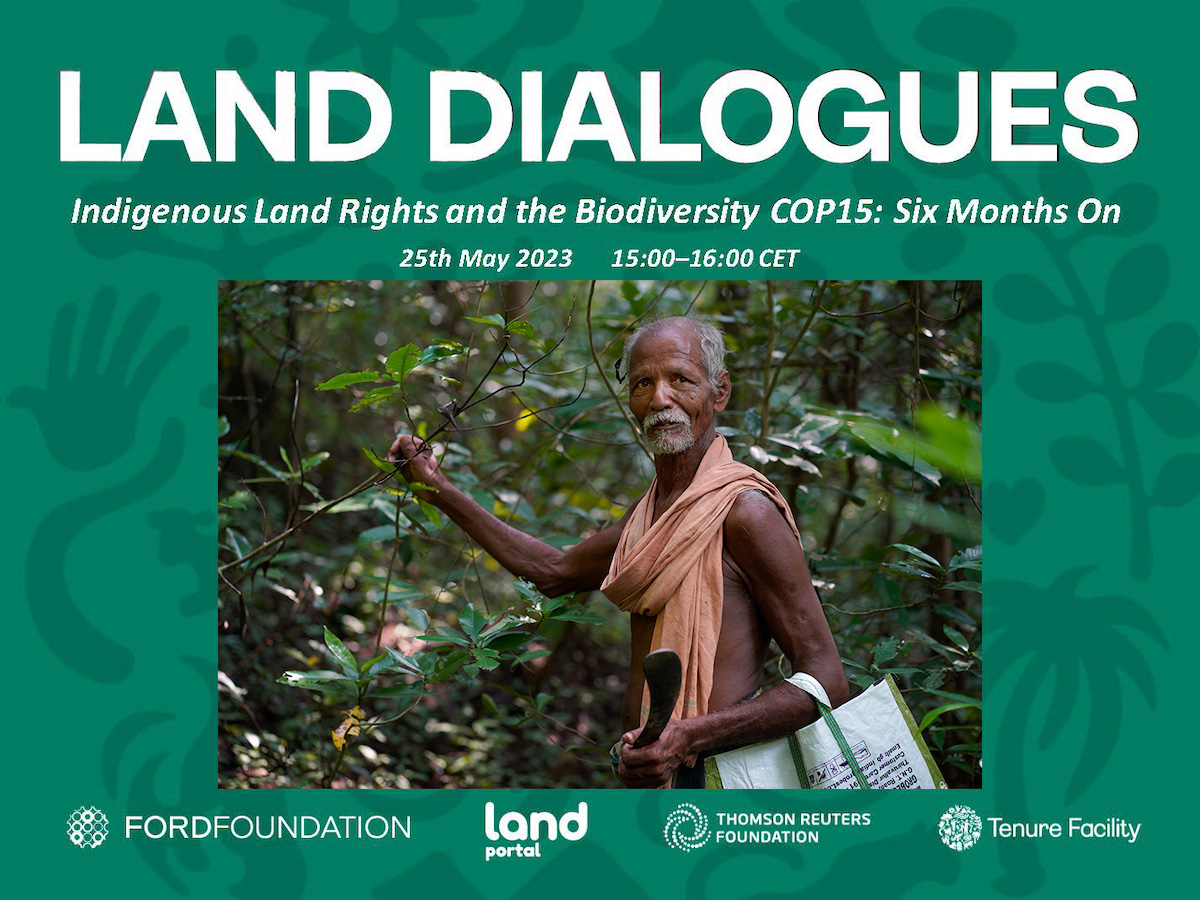OVERVIEW
Under the umbrella of the Land Dialogues series, the second webinar of this year’s series “Indigenous Land Rights and the Biodiversity COP15: Six Months On” took place on May 25th, 2023. The webinar drew in a little over 350 participants and featured panelists from Indigenous women leaders to programme officers. The series is organized by a consortium of organizations, including the Land Portal Foundation, the Thomson Reuters Foundation, the Ford Foundation and the Tenure Facility.
The webinar was organized around three main themes:
- What are thoughts on some of the outcomes from COP15? Have Indigenous Peoples’ land rights and their roles as custodians of conservation been recognized?
- Some Indigenous groups fear that the 30 by 30 target could be used to take away their land under the guise of conservation, while others have said the 30% goal is not ambitious enough. What are reactions to this?
- How can we elevate and use Indigenous knowledge and data in designing programmes on biodiversity conservation?
Thin-Lei Win, journalist, Food Systems and Climate Change, moderated the panel, which featured the following speakers:
- Jennifer Tauli-Corpuz, Senior Global Policy and Advocacy, Nia Tero
- Christine Kandie, Executive Director, Endorois Indigenous Women Empowerment Network
- Alexandre Caldas, Chief of Country Outreach, Technology and Innovation Branch in the Science Division, UN Environment.
Please see a brief recap of each of the three main themes and watch the replay at the bottom for the full captivating conversation.
- What are thoughts on some of the outcomes from COP15? Have Indigenous Peoples’ land rights and their roles as custodians of conservation been recognized?
Christine Kandie: In regards to biodiversity, the story of the Endorois community that was evicted back in 1974 to create a conservation area for tourism reasons in order for the Government of Kenya to get revenue, is essential. This was an area that has great importance to our community and has a lot of value to us. Despite this, Indigenous Peoples have not been consulted in this regard. For example, when we talk about conservation and restoration, the Government of Kenya is making high-level decisions and us, Indigenous Peoples, were unable to go into these decision-making spaces to share our views and thinking in regards to deliberations that were going to affect our livelihoods. With regards to the COP15, my key suggestion is that we need to strengthen Indigenous Peoples in boardroom discussions, facilitating them to attend these meetings and building their capacities in terms of negotiation skills. They should be able to utilize these available spaces to share their issues, because we know that Indigenous communities are custodians when it comes to restoration. They know exactly what can be done through their practices. Lastly, I want to say, if you want to conserve, first of all recognize our rights, recognize our struggle, give us land ownership and title deeds.
- Some Indigenous groups fear that the 30 by 30 target could be used to take away their land under the guise of conservation, while others have said the 30% goal is not ambitious enough. What are reactions to this?
Jennifer Tauli-Corpuz: The 30 by 30 target is very controversial. In fact, then, when the negotiations were beginning, different groups were approaching the Indigenous Peoples Caucus asking for support for the different proposals. For us, the fear is that it would result in stronger pressures on Indigenous Peoples' lands and that it might result in further violations of rights if not done in the right way. In short, there is good language in the framework. It can be used as as a tool, and it should not matter if the land is customarily owned, or if Indigenous Peoples are recognized or not. Because there is language there that is broad enough to capture the the different contexts in which we find ourselves. So we have to use this tool, pull advantage in order to fight for our rights as Indigenous Peoples.
- How can we elevate and use Indigenous knowledge and data in designing programmes on biodiversity conservation?
Alexandre Caldas: The problem is the following. The science is right and the data is there. How do we move this into action though? This can sometimes be the big problem. We sometimes tend to forget how important the data and the science are. UNICEF, for example, has a program for the digital identification of women at birth. In Mozambique, 60% of young girls don't get an identity. This is because often times they engage in domestic work and don’t enlist in the army and don’t have property. How can this happen in the modern world today? Because of this, UNICEF has launched a program that has been having tremendous results just by having the digital identification of young girls at birth. This gives an example on the importance of the sciences. But action on the ground needs to be detailed to protect actual human rights, particularly for Indigenous communities.
Listen for more...

